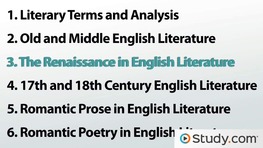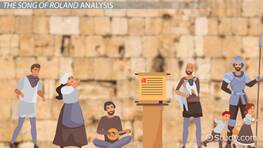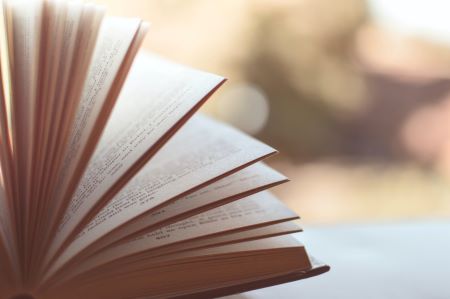- English Language Arts Grade 9 Skills Practice
- English Language Arts Grade 10 Skills Practice
- English Language Arts Grade 11 Skills Practice
- English Language Arts Grade 12 Skills Practice
Explore Literature
Literature Courses and Lessons
The goal of any literature course is to give the student access to a wide variety of texts and examples of writing and to help students learn more about human nature.
Explore our full library of literature courses:
English 101: English Literature
English 102: American Literature
English 103: Analyzing and Interpreting Literature
English 301: Non-Western Literature
English 310: Short Stories
Explore our full library of literature courses:
What is Literature?
Literature includes a wide variety of textual formats which includes poems and prose. Prose can be nonfiction or fiction; the latter includes novels and short stories. Literature can also be in a dramatic format and performed as plays. It also includes religious texts, children's books, and graphic novels. Every culture has its own literary tradition, and literature has been passed down through generations with stories and folktales that have helped preserve cultures. Literature can help teach lessons to readers that often revolve around a common theme or human experience, or can help readers ask questions and ponder new circumstances.
Literature is an important part of any curriculum. Students learn about the world in a new way and can choose from a broad array of works that cover the spectrum of human emotions and experiences. This can give learners a better understanding of the world around them and expose them to people and places that they would not otherwise learn about. Literature provides students with the critical thinking skills and knowledge to read and analyze texts closely. Study.com offers many courses, including courses geared toward elementary-aged children through high school and college students. The level of difficulty increases as students progress through the various courses offered.
Literature contains many fields, including American Literature, African-American Literature, and British Literature. Study.com includes all of these courses and more. Many of these courses can help students working toward a degree earn credits, which are accepted at many colleges and universities. In addition to earning credit, literary studies give students a broader appreciation of cultures and time periods worldwide. Students can benefit from the practice quizzes and content included to bolster their appreciation and knowledge of literature.





Literary Lessons and Skills
The literature lessons and skills section focuses on high school common core standards. Each grade level is divided into four sections: grammar, vocabulary, reading, and writing. Students have the opportunity to take practice quizzes on a variety of subjects. In grade 9, students will practice identifying various types of clauses in a sentence. They will also study the meaning of words and how they are used in sentences. Students will have the opportunity to learn how to revise their writing, a skill they will need for high school and beyond. Students will also read passages similar to the ones they will see on school tests, so they can practice reading comprehension skills that will support their learning.
The grade 10 practice section introduces the grammar skill of comparing adverbs and adjectives. Students can build and expand on the skills they worked on in grade 9. Students will practice analyzing nonfiction and fiction passages and examine how to best read and interpret these passages. Students will practice analyzing more complex literary devices, like anaphora and epistrophe. These skills will give students extra practice with writing skills, such as creating a thesis statement. Students can read practice thesis statements and determine why one is a more substantial piece of writing than the other.
The lessons and skills in grades 11 and 12 deepen a student's understanding of grammar, vocabulary, reading, and writing further through more complex reading passages and writing skills. Students can practice additional grammar skills, such as correcting inappropriate shifts in verb tense. Students will also practice using etymology to determine the meaning of a word they do not know. This skill will benefit students who take literature courses in high school in college.
Students can benefit by beginning in the grade 9 section and testing their knowledge of their grammar, vocabulary, reading, and writing. This assessment will give students a baseline of their skill level. They can then progress through each skill and practice section as needed to check their understanding of the content. All of these sections include important grammar skills that are often not taught directly in high school English courses but that students will need to know to write effectively. Writing effectively and analytically reading are important skills to guarantee success in college and beyond.
Literature Tutors
Study.com has partnered with the award-winning Tutoring team at Enhanced Prep to bring you personalized online Literature tutoring. Discover a unique tutoring program to get you the grade, score, or school.
Enhanced Prep provides a truly customizable approach to tutoring, focusing on each student's specific needs. Students are matched with the right tutor who can help them study for a Literature test one day and prep for their upcoming college entrance exam the next.
Enhanced Prep professional tutors have a minimum of 5 years' experience helping students get into their dream schools. Other leading services require as little as half a year of experience.
No two students are the same. Tutors create a unique game plan for each student following an assessment of their individual strengths and weaknesses.
How to Survive AP English Literature
 |
High school students may find AP English Literature and Composition to be a bit daunting, as it is a college-level course centered on literary analysis and writing. In addition, this course leads up to a three-hour-long AP exam you may decide to take to earn college credit. However, there are ways to study smartly and support your learning so you feel ready for class as well as your AP exam. Read on for resources to help you prepare, and different tips and tricks to ensure that you not only survive AP Literature, but that you excel with flying colors!
Is AP Lit Hard to Pass?
Every individual has different strengths and areas of growth, so AP Lit may be more or less challenging to each person. However, as it is a college-level course, you can expect that there will be quite a bit of work involved throughout the class as your teacher prepares you for the AP exam. Besides being sure to complete all your work, there are other tips for helping you pass your AP Lit class and exam:
Tip 1: Keep Up with the Reading
This may seem obvious, but one of the most important things to help you in AP Lit is to actually do the reading. If you fall behind on your reading, you may feel unprepared for your class assignments, which can affect how much of the class material you understand. By staying on top of your reading, you set yourself up for success because you can follow along with lectures and activities instead of being three steps behind while trying to just to catch up on what the reading was in the first place. Plus, it can be very difficult to do any literary analysis if you don't read the text you're analyzing.
Tip 2: Study in Bite-Sized Sessions
You have almost the entire school year to study for the AP exam - make good use of it! If you plan out your study methods throughout the year, and especially the months before the exam, you won't be overwhelmed trying to learn and remember everything you learned all year within the last week approaching the AP exam. Do short study and review sessions starting at the beginning of the year so you have a strong foundation before studying more often closer to your exam.
Tip 3: Complete Practice Tests
There are many practice tests and essays online that you can find, and your teacher should offer you practice work throughout the year, so you have a good idea of the format of the AP exam. By completing practice tests, you'll be able to understand which areas you do well in, and which areas you need further support in. These practice tests can strongly help guide your study sessions, as well as the questions you ask your teachers and peers.
Tip 4: Relax
It is important to remember to stay as relaxed as possible during the school year and for your AP exam. Life is stressful but learning while stressed can be a recipe for disaster, because it can be even more difficult to truly understand information and gain new knowledge if you are in a state of fear. While test anxiety and academic anxiety is incredibly common and can be hard to overcome, you can practice mental health strategies throughout the school year to not only help support your mental well-being, but also help you feel more confident in your AP Lit class and exam.
Advice for AP Lit Essays
It should be of no surprise that AP Literature involves a lot of writing and literary analysis. Your teacher will assign you multiple essays throughout the year in order to properly prepare you for the AP exam's two-hour free response section, which consists of three essay questions and results in 55% of your total exam score. Here are some tips to help you in your essay-writing process:
Familiarize Yourself With the Rubrics
As part of studying for the AP exam and writing your class essays, you should look at the rubrics so you know what to expect for each of the three essay questions. For example, each rubric of the AP exam explains how the points will be distributed, as well as what you need to do to get the highest points possible for each question.
Don't Just Summarize
Don't fall into the trap of summarizing the prompts or literary pieces in your theses or throughout your essays. Your thesis should be your argument in response to the prompt - not a rewording of the prompt itself. In addition, while you will need to provide literary evidence to support your claims, these pieces of evidence should be succinct, specific, focused, and integrated well in order to further dive into your commentary.
Avoid Generalizations
You don't want to make general statements like "Many people feel that home is not always a place..." or "Life has its ups and downs, but people still survive..." in your essays. These are just fluffy statements that offer no significant value or analysis to your essay. It is important to be as specific, efficient, and purposeful as possible when writing your claims, evidence sources, and commentary in your essays.
Read the Prompt, Then Read It Again
You don't want to do so much work preparing for an essay, only to realize that you're answering the prompt incorrectly. Make sure you completely understand the prompt before responding to it, especially when taking your exam. It may even help to rewrite the prompt in your own words for your own notes, to solidify your grasp of the question.
Write Outlines
While you only have two hours to write three free response essays, it can be very helpful to refer to your classroom practice of writing outlines for your essays - your teacher taught you this for a reason! If you take some minutes to roughly draft your thesis, evidence, and commentary for each question (whether you want to do it one at a time or all at once) it can help keep you organized while writing the essays.